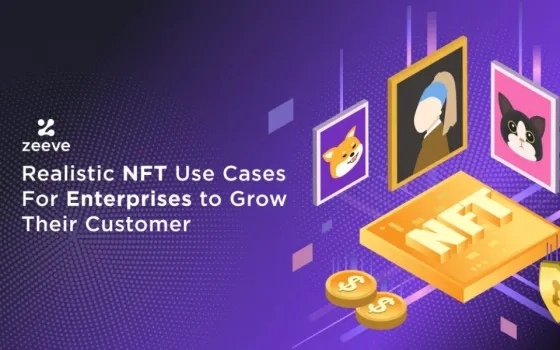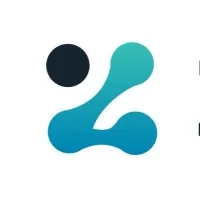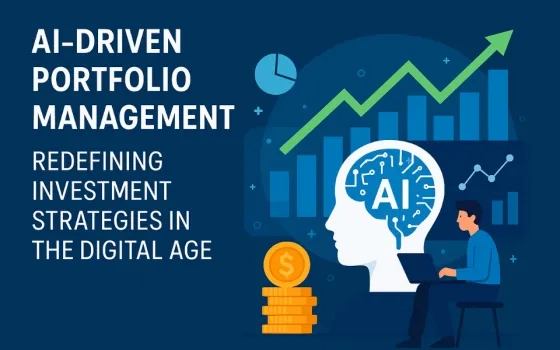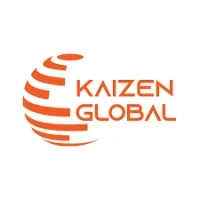It is undeniable that Non-Fungible Tokens (NFTs) have become extremely popular recently. They have been used for a wide range of applications, from art to documents, music, gaming, real estate and so on. The potential of NFTs to revolutionize how we view digital ownership, art, and identity is responsible for its increasing popularity. They offer a secure, immutable, and transparent platform for developers, creators, and consumers to transact and interact with each other. Consequently, enterprises have started to explore ways of employing this technology for their own benefit. This blog post aims to provide enterprises with an overview of some of the most popular uses of NFTs, as well as how they can be implemented on our NFT platform to gain and retain customers, reward employees, explore new revenue streams and create publicity for their brand.
At our core, our mission is to empower businesses to take advantage of the latest web3 technologies, providing them with the tools to maximize their online presence, foster customer loyalty, and drive innovation and growth. Hence, we have compiled a list of 25 interesting ways in which enterprises can use NFTs to create an engaging and rewarding experience for their customers and employees by creating an exciting buzz around their brand.
1. Unique Digital Artwork
NFTs have taken the digital art world by storm by creating new opportunities. Through blockchain technology, these tokens provide a secure and authentic way for creators to protect and monetize their art. With tokenized artwork, collectors can purchase digital pieces with confidence and resell them on third-party marketplaces, giving buyers more freedom and control over their investments. Creators can also benefit from limited-edition artwork – a feature enabled by NFTs. By building scarcity into the token code, demand is driven up and the artist can potentially make higher profits. Smart contracts can also be set up to ensure that a portion of any resale profits go back to the original creator. This allows artists to share in the long-term gains if the artwork suddenly becomes popular.
Zeeve distributed file system(ZDFS) is a secure, enterprise-grade decentralized storage service built on top of IPFS. It pins all your content in our wider IPFS nodes network so that it remains accessible and easily retrievable even when your local node isn’t online.
Businesses have a unique opportunity to gain an edge in the marketplace by partnering with creators to create customized NFT collections. These collections can be used to reward customers, employees, and even increase the value of the tokens. Additionally, these collections can help businesses generate brand buzz, as they combine traditional and digital production techniques to create a truly one-of-a-kind and memorable experience. Enterprises can unlock the potential of NFTs and create an unforgettable experience for customers and employees alike.
2. In-game Assets
As traditional gaming and digital assets continue to converge, NFTs are powering a new world of gaming. NFTs store unique pieces of digital data on the blockchain, allowing gamers to purchase, own, and trade rare items, weapons, costumes, and more. Not only can gamers possess these items, but they can also unlock special events, priority queue status, and other privileges over other players.
According to Mordor Intelligence, blockchain gaming is expected to experience outstanding growth in the next five years, providing an exciting opportunity for both gaming companies and enterprise brands to create digital assets for the metaverse. For example: Nike has taken the plunge by launching NFTs of their popular shoe. But the pertinent question that emerges is as to what is the best way for enterprises to leverage this technology to reach a larger audience?? By creating assets for the metaverse, they can unlock the potential of their NFTs and make them available in a myriad of games and platforms, allowing them to reach a much larger audience than ever before.
3. Identity verification
NFTs are revolutionizing the way organizations verify identities. By encrypting personal information into a token of value and placing it on the blockchain, NFTs are virtually impossible to counterfeit or access. Encryption makes data immutable, so any changes made are immediately flagged and detected by the system. Securing sensitive data is essential in order to prevent any unauthorized changes or theft. By taking the necessary precautions, enterprises can ensure that the data remains secure and protected. Enterprises can leverage NFT technology to create their own identity verification frameworks. These frameworks can be customized with authentication parameters and provide low-level auditability to ensure a secure and reliable process. NFT technology is a powerful tool for enterprises in need of identity verification. As the use of NFTs increases, organizations will be able to power new membership, loyalty and reward programs, creating a strong connection between customers and brands.
4. Loyalty Programs
In today’s digital landscape, enterprises need to explore new ways to differentiate themselves and provide unique customer experiences. One way to do this is by leveraging NFTs, a type of digital asset that leverages blockchain technology to provide authentication and traceability. NFTs are highly secure and can be used to create loyalty programs that are both secure and customizable, enabling enterprises to create tailored customer experiences that can be tracked and monitored. Starbucks’ “Odyssey” is one example of an NFT-based loyalty program that provides enhanced security, greater flexibility, and tailored rewards to individual customers. Security measures not only keep customers safe and secure, but they also create opportunities to engage customers and gain media attention. By providing extra security measures, businesses can create a more connected customer base and bring attention to important announcements. Enterprises can leverage NFTs to create more engaging loyalty programs and meet the needs of customers in the digital age.
5. Supply Chain Management
Through the use of NFTs, enterprises can track goods, transactions, and regulatory approvals more effectively. This newfound transparency allows companies to better serve their customers and build trust in their supply chain management systems. NFTs can help enterprises win new customers and retain old ones by providing a secure, private, and efficient way to track products from source to shelf. The immutable record of all transactions on a single blockchain-secured ledger limits potential fraudulent activity and helps companies ensure their goods reach customers quickly. Not only can NFTs streamline legacy systems, but they can also help eco-conscious brands verify and track their environmental bonafides, creating a marketing platform from the very business of getting goods to market.
6. Real Estate Ownership
NFTs can be used to tokenize real estate, allowing for the secure transfer of ownership of physical assets. These tokens offer secure, immutable, and transparent transfer of ownership, allowing enterprises to build trust and loyalty with their customers. With the use of blockchain technology, NFTs can securely store crucial information about a property, and these tokens can be exchanged, tracked, traded, and sold like a physical asset. Companies now have the potential to capitalize on their physical assets by monetizing them or collecting finances by means of digital holdings. This provides new opportunities for income generation. Enterprises can use the new NFT-backed real estate opportunities to win new customers and retain old ones.
7. Fashion and Wearables
By creating digital versions of the luxury fashion and wearable products that can be stored on the blockchain, companies can give customers the assurance of authenticity, exclusivity, and ownership. This could help to attract new customers, as well as build loyalty with existing ones. Additionally, businesses can use NFTs to offer exclusive deals and experiences to customers, especially in the context of virtual stores or gaming experiences. With NFTs, businesses can offer customers a secure way to purchase virtual items, such as jackets or shoes, which are stored securely on a blockchain. This ensures customers are the sole owners of their purchased item and eliminates counterfeiting concerns.
By pairing luxury goods with NFTs provides customers with a way to show-off their unique, lavish purchases, ensures provenance and authenticity, and in turn also allows companies to claim rights to sales years down the line. The novelty of NFTs helps attract new customers to your business and building loyalty with existing ones.
8. Events and Ticketing
NFTs are particularly beneficial for event organizers, as they can create digital versions of tickets that are impossible to counterfeit. Individuals can rest assured that their ticket is truly theirs and can be stored securely on the blockchain or transferred to a new owner with ease. The NFL has already begun to mint tickets as NFTs, allowing customers to keep a collectible version of the ticket after it has been used. This is just one example of the potential for NFTs to revolutionize customer relations.
9. Virtual Land
NFTs enable the development of virtual worlds, where portions of the world are divided into exclusive pieces of property, allowing consumers to purchase them and hold absolute ownership of the virtual place. This provides a secure platform for developers to create virtual real estate markets and for customers to invest with confidence.
Blockchain technology provides enterprises with advanced security measures to protect virtual land against malicious actors, thereby ensuring security for their digital assets. Businesses can make other use of NFTs in the context of virtual land. A brand could create a virtual community with limited slots, allowing participants to place their avatars on a mark for visitors to view. This creates an exclusive experience for customers, giving them the feeling of exclusivity and ownership. It also allows enterprises to monetize attendance while creating scarcity and buzz. For enterprises looking to complete stadium renovations, NFTs can provide a unique opportunity to fund their projects. Companies can sell digital seats and create a virtual land market that allows customers to purchase exclusive parcels of property. This provides a safe and secure platform for customers to invest with confidence. Overall, NFTs allow enterprises to create new, innovative ways to engage their customers and provide them with exclusive experiences that increase customer loyalty and retention.
10. Sports NFTs
In the sports arena, NFTs grants teams, leagues, and athletes the ability to tokenize their unique products like in-game items, cards, and memorabilia. OpenSea is a platform for collecting sports NFTs from leagues, players, and brands.In addition to providing a platform for buying and selling digital assets, NFTs enable teams to build a connection with their fans by empowering them to participate in the team’s future. Major sports orgs like the NBA and NFL are using NFTs to build buzz and attract new people to the sports. Leser popular sports and sports authorities can also benefit from this technology. By utilizing NFTs, enterprises can acquire new customers and retain old ones, leading to a higher rate of success in the sports industry.
11. Brand Identity
Businesses can tokenize products/brands to create exclusive digital rewards to recognize customers.These digital assets can be tracked to measure their reach, giving businesses a better understanding of their ROI. In addition, NFTs provide a way to increase brand recognition and allow for a personalized customer experience, making them a valuable asset to any business looking to win and retain customers.
12. Avatars and Profile Photos
Businesses can leverage NFTs to create unique avatars or profile pictures for customers. By allowing customers to customize their own profile images, businesses can build stronger relationships and foster customer loyalty. This can enable them to differentiate themselves from their rivals and create a stronger brand awareness. Additionally, businesses can offer exclusive rewards or discounts to customers who use their custom NFTs. This will not only help them win new customers but also increase customer retention.
13. Entertainment NFTs
By utilizing NFTs, early adopters can gain the reward of a digital asset that has the potential to appreciate in value as the entertainment industry grows in popularity. Moreover, NFTs enable enterprises to track engagement and sales through smart contracts, while also opening up new revenue streams. This is especially beneficial for businesses in the music industry, as they can issue albums with NFTs and benefit from the sales of digital collectibles on the secondary market.
Owing to NFTs, individuals can be granted exclusive access to private communities, forums, and decentralized autonomous organizations (DAOs). NFTs are a unique and trackable way for enterprises to measure engagement and attendance, and also to create a feeling of exclusivity and status for their customers. By using tokens to signify membership, and encouraging customers to show off their NFTs as a status symbol, businesses can drive up the value of their services, events, and products while also retaining their existing customers and attracting new ones. An NFT-based membership strategy can be the perfect way to increase customer loyalty and overall success.
15. Fintech Applications
Enterprises can use NFTs to create unique digital assets that can be used as collateral for loans, to represent complicated financial products, or to enable fractionalized ownership of assets. These features, combined with their use in decentralized finance (Defi) and their ability to create new revenue streams, allow enterprises to win new customers and retain old ones. NFTs can also be used to build communities and make large investments more accessible, thus enabling enterprises to open up new markets and increase their customer base.
16. Photography
Photography is an industry in which rights and usage are of paramount importance. Piracy and improper use of work without compensation to the creator are a major problem. NFTs provide a revolutionary solution by allowing the digitalization of visuals and tracking its use on multiple platforms. This ensures that photographers receive due credit and compensation for their work. The technology allows photos to be validated as authentic, charged for use, and tracked if duplicated without authorization. These features make NFTs a game-changing technology in the digital photo space.
17. DeFi Applications
In DeFi, numerous applications of NFTs are already being utilized. These tokens possess advantages such as durability, transparency, and versatility, as compared to traditional financial services. Such features generate fresh revenue streams, which in turn entice new customers. For NFT owners looking to monetize their possessions, they can take advantage of DeFi platforms to produce liquidity, get collateralized loans, or make money by offering assets for staking. Firms in the DeFi space can incorporate financial structures such as interest into NFTs, thus encouraging users to either store assets or participate in transactions on their platform.
18. Travel Industry
The creation of digital passports through the use of NFTs in the travel industry is a very promising concept. NFTs can provide a secure, blockchain-based platform for travelers to store their important travel documents, making it more difficult for criminals to forge or alter them. At the same time, this platform would make it much easier for authorities to verify the identity of travelers. In this way, NFTs can ensure the safety and security of travelers, as well as providing a more efficient way for authorities to conduct their duties.
A further application of NFTs in the travel sector is the introduction of innovative loyalty plans. Airlines could, for instance, propose the exchange of “flight miles” for reductions on future trips. Hotels, in turn, could provide “room nights” redeemable for free stays or enhancements. There may even be virtual vacations or rooms available as a reward to esteemed customers.
19. Academic and Digital Credentials
NFTs offer a secure and reliable way to store and present academic and digital credentials. Through the use of smart contracts, records such as course attendance, completion, degrees, grades, and ratings can be easily updated, and credentials shared with potential employers or online. With NFTs, institutions have access to a blockchain-based system for securely managing employee credentials, grant submissions, and other legal or regulatory documents. Additionally, an immutable NFT-based credential may be monetizable, with employers being willing to pay extra for the convenience and security of blockchain-backed proof.
20. Domain Name NFTs
Owning an NFT representing a domain name can be highly lucrative. With blockchain domain systems, users can manage and store domains securely using private keys, while enjoying the added benefits of permanent registration in a public registry that can’t be changed or deleted by a third party. Investing in an NFT representing a domain name could be a great way to increase the resale value of your domain, as you can include data on the domain’s value, visits, or content in the contract.
Some other industries where NFT use cases are relevant
NFTs have become increasingly popular in recent years as a secure way to track and trade digital assets. From tracking the provenance of wine bottles to protecting the copyright of literature and books to incentivizing healthy behaviors in healthcare, NFTs are finding a variety of uses in different industries.
Wine NFTs are revolutionizing the industry by providing producers and consumers with a digital record of a bottle’s provenance and authenticity. The NFTs allow for transparency, traceability and verification throughout the supply chain, ensuring that only genuine wine products are bought and sold.
The publishing industry is also exploring ways in which NFTs can help them retain old customers and win new ones. NFTs guarantee the authenticity of digital works, offering a layer of security against piracy and plagiarism, and ensuring creators are properly credited for their work. Through the use of this technology, authors, publishers, and other creators can generate revenue from the sale of ebooks, artwork, and music.
NFTs provide a secure and efficient way to store and share patient records as well as tracking compliance with regulatory requirements like HIPAA. Being one-of-a-kind, non-replicable, NFTs are capable of storing a patient’s medical history, prescriptions, and other essential details. This makes them an ideal choice for healthcare providers to keep tabs on their patients’ information. NFTs could help streamline healthcare operations, reduce paperwork and improve patient experience.
They can also be used to create collectibles for nonprofits and political fundraising, or to create new economies within social media platforms. NFTs provide a unique way to monetize digital content and create a direct connection between creators and customers.
Concluding Thoughts
NFTs are a revolutionary form of digital asset that is transforming the way we conduct transactions and interact with digital goods. They are unique, indivisible tokens that are stored on a blockchain and represent a wide range of digital and physical assets, from artwork and collectibles to real estate, tickets and more. NFTs offer unprecedented opportunities to unlock value, redefine ownership and create new markets. Explore the ever-expanding possibilities and discover the innovative uses of NFTs.
About The Author


Dr. Ravi Chamria is co-founder CEO of Zeeve Inc, an Enterprise Blockchain company. He has an experience of 18+ years in IT consulting spanning across Fintech, InsureTech, Supply Chain and eCommerce. He is an executive MBA from IIM, Lucknow and a prolific speaker on emerging technologies like Blockchain, IoT and AI/ML.
Passionate About: Blockchain, Supply Chain Management, Digital Lending, Digital Payments, AI/ML, IoT
Specialities: Strategic Management, Technology Innovation, Product Management
















